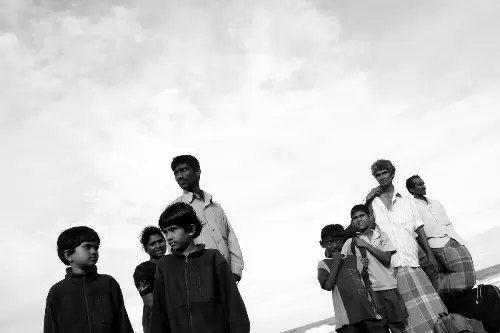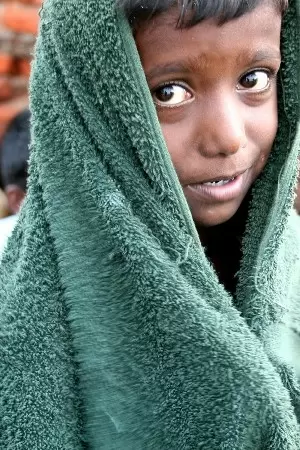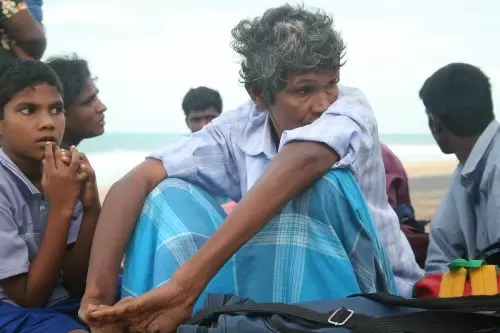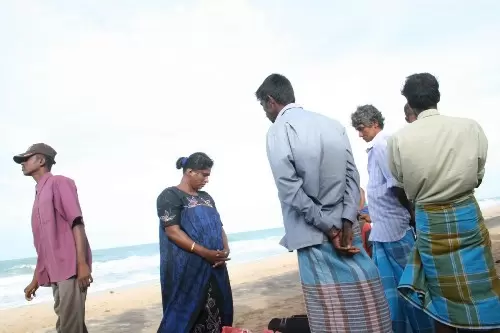Caught between the devil and the deep blue sea, Sri Lankan Tamil refugees have lost a future

03-August-2015
Vol 6 | Issue 31
Tears trickle down the cheeks of Kumaran (name changed) despite his efforts not to lose his cool. But what makes it a poignant moment is his wiping the droplets with the stub of his amputated right arm which ends slightly beneath his shoulder above his shirt sleeve.
The Sri Lankan Tamil refugee was telling his story: How he left home as an 11-year-old boy to join the Liberation Tigers of Tamil Eelam, which fought for a separate nation for Tamils to be carved out of the historic Tamil areas in North Sri Lanka.
 |
|
A group of Sri Lankan Tamil refugees seem to be looking at a hopeless future as they reach Tamil Nadu shores after fleeing from the Sri Lankan Army (File Photos: Senthil Kumaran)
|
“I and a few boys witnessed an explosion at our local library followed by Sri Lankan soldiers pulling out bodies of Tamils and doing all kinds of things on them.
“If I had rifles or even the strength I would have killed at least one of them and died but then I was only a small boy… I don’t know how to tell you ... a woman …they did all kinds of things to bodies, whether dead or alive. What they did to women … we called all women with children as amma (mother) back there, whatever their age…we boys looked with horror at what they did.”
Now in his forties, Kumaran was relieved from the liberation movement more than a decade ago after he lost his arm and badly injured his leg in a shell attack by the Sri Lankan army.
He was smuggled into Tamil Nadu for medical treatment and has been here since then. His struggle today is to get his children educated in Tamil Nadu. He hopes for an immediate job to make a steady living.
He and his wife, Ezhil (name changed) make do with any menial job that comes their way. “We may be refugees but we are not beggars from our land. People everywhere need to understand this about refugees. We had our own homes and land back there. We came because we were persecuted,” says his wife.
Ezhil came to India to get married to Kumaran after she insisted on marrying a handicapped soldier of their liberation army. Now they are two of over 1,02,000 Tamil refugees living in Tamil Nadu.
Those outside the camps are perceived as slightly better off than those living within the 107 refugee camps set up by the state government.
Most of the “camp people” had come by boats to Rameswaram in Tamil Nadu, located just about 20 km from the northern shores of Sri Lanka.
They had come at various periods fearing for their lives since the 1980s and are put up in one of the several government run refugee camps in various parts of Tamil Nadu.
The camp people, as they are known to outsiders, live in small 8 /8 ft or 10/10 ft plots allotted within the camps and are given a packaged minimal dole and strict residential rights.
Those outside the camps living on their own are termed well off since they can move more freely than those in camps and are not monitored everyday as those in refugee camps.
Ezhil, herself has no gold on her person. Only a silver toe ring signals her marital status. Most of what she possessed, she sold in time here, meeting medical, legal and household expenses for the family in an alien country, as she puts it.
 |
|
A Sri Lankan Tamil child in a state of shock on landing as a refugee in Tamil Nadu
|
What is worse is that Kumaran, his wife and children are stateless people, condemned to live the rest of their lives as non-citizens until the state where they reside decides to accord them rights. Their two children aged four and six, were born and brought up in Tamil Nadu.
They all have a refugee registration number, which is referenced every now and then in the local police station whenever required or when they have to move from one place to another within the state of Tamil Nadu. Ezhil, who grew up with the horrors of internal displacement in her home country -13 times displaced due to bombardments as she recalls - is the only valid passport holder in the family.
“Earning a livelihood is our biggest problem. Getting work is also not so easy given that I am differently-abled,” says Kumaran. His wife Ezhil joins in saying that “What we studied there is not recognized here. So we are not at liberty to join a qualified job either.”
She used to be employed to teach English in a school back there. Kumaran's education had ended with schooling. Even those camp refugees who have qualified in the Tamil Nadu schooling and university education are denied employment opportunities in Tamil Nadu as they are refugees.
It is the gross under-employment that impels Sri Lankan Tamil refugees to look for opportunities to flee Tamil Nadu to other countries, like Australia.
While fleeing Sri Lanka, most of the refugees had left their land without valid travel documents and arrived here in a hurry on boats in a bid to escape from shell attacks and aerial bombardments and with a hope of returning to their homes after a while.
A sympathetic government in Tamil Nadu accepted them all as refugees due to humanitarian and political considerations, though India has not signed the UN convention or protocol on refugees to guarantee refugee rights.
The groundswell of support for the Eelam (the Tamil homeland in Sri Lanka) liberation movement among the people of Tamil Nadu would not let any political party to be apathetic to the plight of the refugees.
But now, six years after the end of war in Sri Lanka, the Tamil Nadu government is caught in a bind. After 2009, there has been a spiraling of charges against the Sri Lankan government of continuing persecution of Tamils, land grab by the government and military occupation of Tamil land, non grant of political rights and a civilian - military ratio of 6:1 in Tamil dominated areas.
Also, an entire generation has completely grown up here, not knowing their homeland at all. The refugees who were hoping for a political solution enabling their return have now come to the realization that their struggle is going to be more prolonged than what they had expected.
On the other hand, in India, it is a reality that not all refugees have received the same treatment from the government. The Tibetan refugees live with more freedom of movement and better settlement conditions, than any other refugee population in India.
India has shown no interest in drawing up policies to treat all civilian refugees on par and to enable their free movement. "Tibet has a government in exile at Dharamsala that issues passports to its citizens," notes senior journalist, Sam Rajappa who is an expert on Sri Lanka. He attributes the different treatment given to different refugees by the Indian government to geo-political considerations.
Though the two major political parties, the DMK and AIADMK, have demanded Indian citizenship for the refugees, many of whom are residents of India since 1983, nothing concrete has happened.
The refugees too don’t see a point in returning to their country of birth where their freedom movement has been finished off. They face the risk of persecution with no livelihood opportunities or place to live in.
 |
|
Six years after the end of civil war in Sri Lanka, Tamil refugees are scared of returning to their homeland that is under the control of the Sri Lankan army
|
Further, of the around 4,500 refugees, who have left for Sri Lanka from India since 2011 some have returned with horrific stories. As late as mid-April, 2015, a family of five from a refugee camp - Satyaseelan (45), from Pesalai in Mannar district, his wife and three daughters - returned from Sri Lanka after finding their house occupied by the military and finding no livelihood there.
The refugees in Tamil Nadu, particularly those of the younger generation, are forced to look elsewhere. So the exodus to Australia on boats began. But with Australia sending back the “boat people” or flying out the refugees whose applications are rejected, the boat rides are turning futile.
Refugee activists in Australia have termed their government's activities illegal. The activists have been calling the government to allow refugees in, irrespective of how they come. Activist groups like the Refugee Action Collective (Victoria) have been pointing out that Australia as a signatory of the UN convention on refugees is bound to protect refugees from abuse.
Australian Journalist and activist for refugees, Trevor Grant, who also wrote the book "Sri Lanka's Secrets: How the Rajapaksa Regime Gets Away with Murder," slams Australia's actions as a blatant case of racism.
"A strong racist strain runs through Australian society and it is reflected in the policy of the government against those coming by boats. These people are merely of the wrong colour.
“Both the politicians and the media boost these notions in society. With both the major parties in the country, labour and conservative, reflecting the same attitude towards refugees, the situation is unfortunately not going to change," says Grant in an e-mail interaction. Read the Full Interview: 'Racism is making Australia turn back the boat people'
Activists in Tamil Nadu are accusing Australia of developing a covert understanding with the Sri Lankan government. They point out that Australia has threatened to send back refugees to Sri Lanka even if they had landed there in boats from Tamil Nadu.
One such case had resulted in the self-immolation of a refugee from a camp in Tamil Nadu, Leo Seemanpillai, in June last year. Leo had arrived in Australia, on a boat and had set himself on fire after being threatened with deportation to Sri Lanka from an offshore camp.
After Australia, the refugees are now trying to flee to New Zealand but still face the Australian authorities' high hand at sea. A group of refugees were turned away at sea off Australia in June while on their way to New Zealand, 54 of them Tamils from the North Eastern districts of Sri Lanka out of a total of 65 refugees on boat.
The Australian government reportedly sent the boat back to sea after bribing the boat captain to turn the boat to Indonesia, where they are currently languishing.
"This is a curious case. The Australian navy intercepts the boats on 17 May and gets to know that they are heading to New Zealand and not Australia and leaves them at sea and goes. However they return and then turn them back with a bribe to the boatman, which they had no business to do," notes Thirumurugan Gandhi of May 17 Movement, a group that was involved in negotiating and protesting with the Australian embassy in Chennai following the death of Leo Seemanpillai whose final rites had to be coordinated with his parents living in the refugee camp here.
He also terms the use of words like "economic migrants," to describe these people by Australia as white racism. "Australia uses these words because no white man is going to turn up in boats at their shores. The question is who created these refugees in the first place. It’s the third world countries that are in crisis and those who created this crisis are in the first world and white," he says.
Many Eelam Tamils, fleeing from refugee camps in Tamil Nadu, are languishing in jails or closed camps across countries from Saudi Arabia to Indonesia to Australia after being caught in transit. Yet, the UN has not come up with any solution. "The UN is only as effective as its controllers," notes Trevor, pointing to the political cycle of the powerful within the UN in enabling the crisis.
Australia’s stand that refugees were ‘welcome’ if they possessed valid travel papers is only as farcical as it can be since majority of the Sri Lankan Tamil refugees fleeing from Tamil Nadu (as much as with other war refugees fleeing anywhere), do not travel with documents.
They had left their homes in fear, just to save their lives. Besides, when there is also no people smuggling racket involved in the case of Lankan Tamil refugees leaving the shores of India – here the boat man himself is a refugee who abandons the boat on arrival and surrenders to the authorities seeking refuge – one wonders as to why Australia should look at the ‘boat people’ with so much hostility.
 |
|
Activists have different opinions on offering Indian citizenship to the Tamil refugees
|
These boat people mobilize themselves, organize the funds to buy a boat and fuel and then set sail at their own risk. Several have perished due to the unseaworthy conditions of the boats too. Still another group takes the risk, hoping to find freedom and security in a distant "developed democracy".
Stressing that Australia has a responsibility in giving refuge to Sri Lankan Tamils, fleeing the island nation or Tamil Nadu coast, Thirumurugan Gandhi says: "Australia and Sri Lanka are collaborators in pushing the boats to sea in the first place.
“While the Sri Lankan government is encouraging Tamils to flee their land in order to acquire and occupy Tamil land, Australia which knows of the happenings just looks the other way to collaborate with America. If the boats should stop, as Australia keeps telling, then Australia should work on resolving the issues at hand in Sri Lanka and not encourage Sri Lanka for trade links or other considerations.”
For now, the activists in Tamil Nadu are also backing grant of Indian citizenship as a helpful measure, though some others have a different view to offer.
"More than half of those in the refugee camps are plantation Tamils or Indian origin Tamils who can be considered to have a natural stake in India, but neither they nor the Eelam Tamils would be willing to turn into Indian citizens as both had lived in culturally and socially higher human development indices in their homeland. It’s also a fact that they have not integrated locally here either," says Paul Newman, who is the Advocacy Officer for South Asia for Jesuit Refugee Service.
"It’s a bad proposition to urge the refugees to return to Sri Lanka without a political solution," both Paul Newman and Thirumurugan Gandhi say.
“The UN High Commission for Refugees (UNHCR), which basically does not have a policy based humanitarian presence here in India or Chennai, should think of a third country resettlement option for Tamil refugees who are not very huge in numbers just as in the case of the 70,000 Bhutanese who were repatriated to USA from Nepal jointly by the UNHCR and the International Organization for Migrants on a permitted quota in developed countries. Only those willing can be given Indian citizenship," says Newman.
Meanwhile, refugees in Tamil Nadu just expect employment commensurate with their qualification without any discrimination at workplace.














